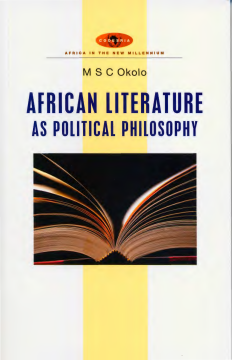
Additional Information
Book Details
Abstract
The politics of development in Africa have always been central concerns of the continent's literature. Yet ideas about the best way to achieve this development, and even what development itself should look like, have been hotly contested.
African Literature as Political Philosophy looks in particular at Achebe's Anthills of the Savannah and Petals of Blood by Ngugi wa Thiong'o, but situates these within the broader context of developments in African literature over the past half-century, discussing writers from Ayi Kwei Armah to Wole Soyinka. M.S.C. Okolo provides a thorough analysis of the authors' differing approaches and how these emerge from the literature. She shows the roots of Achebe's reformism and Ngugi's insistence on revolution and how these positions take shape in their work. Okolo argues that these authors have been profoundly affected by the political situation of Africa, but have also helped to create a new African political philosophy.
M.S.C. Okolo was educated at the University of Calabar, and then at the University of Ibadan where she received her Ph.D in Philosophy. She also has a PG.D in Public Relations. A Civitella Ranieri Fellow, she is the author of Winds on my Mind, Leaps of Faith and has contributed to many short stories and poetry anthologies. Her short story 'Those Days' won a Liberty Merchant Bank Prize. Her Ph.D thesis won the CODESRIA Doctoral Prize, 2005.
Table of Contents
| Section Title | Page | Action | Price |
|---|---|---|---|
| Cover\r | Cover | ||
| Contents | v | ||
| Acknowledgements | vi | ||
| Abbreviations | vii | ||
| Introduction: a neglected benefit | 1 | ||
| Outline of the book | 3 | ||
| Literature as philosophy: a theoretical framework | 5 | ||
| Philosophy | 5 | ||
| Literature | 11 | ||
| The affinity between philosophy and literature | 13 | ||
| Literature as political philosophy | 22 | ||
| Literary works as examples | 28 | ||
| Chinua Achebe and Ngugi wa Thiong’o as political thinkers | 35 | ||
| Chinua Achebe: a brief introduction | 35 | ||
| Ngugi wa Thiong’o: a brief introduction | 36 | ||
| Political thinkers | 38 | ||
| Achebe and Ngugi as political thinkers | 53 | ||
| Political concepts | 60 | ||
| Achebe’s reformist agenda in Anthillsof the Savannah | 78 | ||
| Plot | 78 | ||
| Reformist agenda: ‘no’ to the one-solution approach | 82 | ||
| New radicalism: a welcome panacea | 87 | ||
| ‘Leader-centrism’: a thesis in self-conflict | 92 | ||
| Conclusion: merits against all odds | 95 | ||
| Ngugi’s Marxist aesthetics | 98 | ||
| Marxist aesthetics: a clarification | 98 | ||
| Ngugi: champion of Marxist aesthetics | 101 | ||
| Petals: a blend of vision and practice | 102 | ||
| Crystallizing an ideology | 109 | ||
| Cracks on the wall: weaknesses in the inner logic of Marxist ideology | 113 | ||
| Conclusion: not easily put out | 117 | ||
| Achebe and Ngugi on the African condition | 123 | ||
| Class analysis | 123 | ||
| Dependency in Africa’s underdevelopment | 132 | ||
| Leadership in social change | 134 | ||
| Which way for Africa? | 136 | ||
| Process | 137 | ||
| Institutions | 139 | ||
| Agency | 141 | ||
| Conclusion | 144 | ||
| Notes | 145 | ||
| Bibliography | 147 | ||
| Index | 161 |
